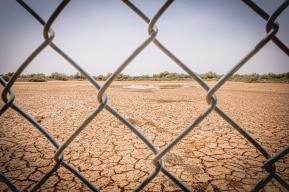فكرة
جرائم في حق البيئة

إن النزعة إلى إنكار ظاهرة المناخ زادت من مخاطر تطور كارثي على الصعيد العالمي. فهل يجب اللجوء إلى القانون الجنائي الدولي لردع أتباع هذه النزعة؟ ولم يعد للقَادة الاقتصاديين والسياسيين مجالا للتبرّؤ. سواء كانت متسببة في أضرار بيئية أو مكتفية بتجاهل التهديد المسلط على بقاء الجنس البشري، لا بد أن تتحمل الحكومات والمؤسسات المسؤولية التي تقع على عاتقها جراء تصرفاتها أو امتناعها عن التحرك إزاء تغير المناخ.
بقلم كاتريونا ماكينون
اندلع حريق في مسرح غير مجهز بمخارج الطوارئ. إذا لم يتم التحرّك في الحين، فسوف تتسبب النيران في هلاك أكبر عدد من الحضور، أو على الأقل في إيذائهم، ابتداءً بالذين يحتلون أرخص المقاعد. انتشرت رائحة الدخان بين الناس، لكن بعضهم لم يلاحظ شيئا، في حين يحاول البعض الآخر دق ناقوس الخطر حتى يتم احتواء الحريق قبل أن يخرج عن نطاق السيطرة. وتحاول مجموعة أخرى من المتفرجين - أغلبهم يحتلون أفضل المقاعد - الصراخ بصوت عالٍ لنفي وجود الحريق أو للتأكيد على أنه ليس خطيرًا أو أن هناك متسعًا من الوقت لإخماده، مستخدمة لغة العواطف للإصرار على عدم الوثوق بالمجموعة الأخرى.
في المسرح، ارتبك العديد من الناس من هذه الرسائل المتناقضة، ومنهم مَن خيّر الاقتناع بالخطاب النافي لوجود الحريق. ونَظرا لكثرتهم، تسبب سلوكهم في إبطاء جهود الذين أصغوا لناقوس الخطر محاولين إخماد النيران. في مثل هذا الوضع، يجب إسكات من يصرخون «الإنذار خاطئ!» لأن الحريق موجود فعلا ويتطلب تحركًا عاجلاً وفوريًا لاحتوائه قبل أن يخرج عن نطاق السيطرة. إلا أن مقاومة اللهيب ليست على الشكل الصحيح لأن عددا كبيرا من الحضور لا يدري من يصدق.
هل بالإمكان مقارنة الذين ينكرون حقيقة تغير المناخ بالمجموعة التي تحتل أفضل المقاعد في المسرح؟ الجواب واضح: نعم.
التسريع في انقراض البشرية
تعد العقوبات الجنائية من أقوى الأدوات للإبلاغ عن التصرفات التي تتجاوز حدود المسموح به. إن السلوك الإجرامي من شأنه أن ينتهك الحقوق الأساسية للإنسان ويقضي على أمنه. وتُفرض أقصى العقوبات على الجرائم التي تلحق الضرر بأثمن ممتلكاتنا. وهذا هو تحديدا ما يحدِثه تغير المناخ.
خلال ما يقارب 250 سنة، استهلكنا الوقود الأحفوري للحصول على طاقة رخيصة، ودمّرنا أحواض الكربون، وتركنا أعداد سكان العالم تتزايد، بالإضافة إلى أننا لم نضع حدا لتأثير مصالح الشركات على العمل السياسي، علما وأن الحد من هذا التأثير المؤذي هو الكفيل بتمكيننا من التصرف في هذه الكارثة. ووفقًا للتقرير الخاص الصادر في 2018 عن اللجنة الحكومية الدولية المعنية بتغير المناخ، لم يبق لنا إلا عقد من الزمن، على أقصى تقدير، لتفادي نفاذ ميزانية الكربون المقترنة بنسبة 1،5 درجة مئوية. وفي حالة الاستمرار على النسق الحالي للانبعاثات دون اتخاذ الإجراءات الملائمة للحد منها، فقد ترتفع الحرارة بحلول عام 2100 بنسبة تتراوح ما بين 4 و6،1 درجة فوق معدل الاحترار قبل العصر الصناعي. وحتى إن التزمت جميع الدول بالأهداف المنصوص عليها في اتفاقية باريس 2015 من حيث الحد من الانبعاثات، نبقى معرضين لارتفاع في درجات الحرارة بما لا يقل عن 2،6 درجة بحلول عام 2100.
ومن المتوقع أن يكون ارتفاع الحرارة بنسبة تتراوح بين 4 و6،1 درجة بحلول عام 2100، كارثيا. فقد تصبح مساحات شاسعة من الأرض غير صالحة للسكن مع علو مستوى سطح البحار وارتفاع مفرط في درجات الحرارة. وقد تتسبب التقلبات المناخية، وضعف المحاصيل الزراعية والصراعات الناجمة عن الهجرة المكثفة غير المسبوقة في تاريخ البشرية في إحداث ضغوطات شديدة على المناطق الصالحة للسكن.
وفي مثل هذه الظروف الهشة والمضطربة، فقد تؤدي ردة فعل رجعية ناجمة عن الاحترار إلى تعريض البشرية لخطر الانقراض، حسب مجلة فيوتشرز (سبتمبر 2018). وتحدُث ردة الفعل الرجعية عند بلوغ نقطة تحول في نظام المناخ من شأنها أن تولّد عمليات لها تأثير على تفاقم الاحترار: على سبيل المثال، لما تتحول غابة الأمازون من أكبر حوض يمتص الكربون في العالم إلى مصدر للكربون، أو لما يتقلص الجليد القطبي فينخفض مستوى انعكاسات الكوكب وبالتالي يحصل تسريع في ارتفاع الحرارة. وقد وصف التقرير التقييمي الخامس الصادر عن الفريق الحكومي الدولي المعني بتغير المناخ نقاط التحول على أنها تمثل عتبة حرجة يمر فيها المناخ العالمي أو الإقليمي من حالة مستقرة إلى حالة مستقرة أخرى.
قد لا يكون ارتفاع الحرارة بنسبة تتراوح بين 4 و6،1 درجة مئوية امراً محتملا، ولكنه أيضا، ليس من باب الخيال. فكل عام يمر دون القيام بجهود محكمة للتقليص من الحجم الصافي للانبعاثات حتى يصل إلى مستوى الصفر بحلول عام 2050، يجعل هذا التهديد أكثر واقعية. وبالرغم من أن اتفاق باريس قد رفّع أهداف التقليص لسد فجوة الانبعاثات بحلول عام 2030، إلا أننا قد بلغنا فعليا درجة مئوية واحدة من الاحترار. ونَظرا للفارق الزمني بين الانبعاثات والاحترار الناجم عنها - بسبب طول عمر جزيئات الكربون في الجو - فمن المتوقع أن يتجدد الارتفاع.
تصرفات غير مسؤولة
هل يجب اللجوء الى القانون الجنائي للتصدي لتغير المناخ؟ في مقدرة الجيل الحالي في عصر الأنثروبوسين إتلاف البيئة والإضرار بها لحد انقراض البشرية. ويمثل مفهوم «جريمة إفناء البشرية» حلا تمليه علينا القيم الأخلاقية للرد على الظروف الجديدة في عصر الأنثروبوسين.
ويمثل القانون الجنائي الدولي إطارا جيدا لمواجهة تهديدات تغير المناخ على الحياة البشرية، إذ أنه يهدف إلى حماية المجتمع البشري بأكمله بغض النظر عن الحدود الوطنية الحالية والمستقبلية. كما أنه يدافع عن القيم التي تربط الشعوب بعضها ببعض عبر الزمن، ويؤكد إدانة «الفظائع التي لا يمكن تصورها والتي هزت ضمير الإنسانية بقوة» – كما نص عليه نظام روما الأساسي المؤرخ في 17 يوليو 1998 الذي يحدد الجرائم الدولية التي تخضع إلى اختصاص المحكمة الجنائية الدولية.
يقف وراء كل جريمة مجرم. وبالرغم من أن الموت والمعاناة الناتجة عن التأثيرات المناخية مروعة لضمائرنا، إلا أنها ليست كافية لملاحقة الجناة قضائيا بموجب القانون الجنائي الدولي. فالانفجارات البركانية تتسبب أيضا في الموت والمعاناة دون أن يوجد مسؤول عنها. لقد نتجت الأزمة المناخية الحالية عن النشاطات البشرية على مدار الـ250 سنة المنصرفة وما أدت إليه من تراكم غازات الدفيئة في الغلاف الجوي. كما تعتبر هذه الأزمة نتيجة أفعال غير مقصودة أدت شيئا فشيئا إلى تدمير أحواض الكربون والزيادة في تدفّقاته وتركيز مخزونه. وتقع جل هذه الأفعال خارج نطاق القانون الجنائي الدولي وذلك لسبب بسيط وهو أن المسؤولين عنها قد فارقوا الحياة. لنقل معظمهم، لكن ليس جميعهم.
جريمة إفناء البشرية
اقترحت إضافة جريمة جنائية جديدة في القانون الجنائي الدولي تحت تسمية «جريمة إفناء البشرية» (بوستريسايد)، ويدل هذا المفهوم على ممارسة متعمدة أو سلوك متهور من شأنه أن يؤدي إلى انقراض البشرية.
وتتمثل الجريمة في تعريض البشرية لخطر الإنقراض من خلال سلوك إما متعمّد عن سوء نية، وإما عن دراية بالتأثيرات التي سيخلفها. فعندما يكون المرء على دراية بأن سلوكه سوف يعرّض غيره لمخاطر لا يمكن القبول بها، ويستمر مع ذلك في هذا التصرف، يكون بذلك قد سلك سلوكا متهورا. وبالفعل، يقع السلوك الإجرامي الذي من شأنه أن يُصنف كجريمة إفناء البشرية في مربع التصرفات المتهورة التي تتسبب في تفاقم تغير المناخ.
لا يمكن أن تتسبب انبعاثات الكربون المنبثقة عن شخص واحد في انقراض البشر بفعل تأثير المناخ... مع كونه في مقدور الطائرات الخاصة وآبار النفط العديدة القيام بذلك. ولكن كل فرد يتقلد زمام الحكم السياسي أو الاقتصادي له إمكانية تقدير مدى تأثير تصرفاته كقائد في تفاقم الأزمة المناخية. حيث بإمكان رئيس الدولة أن يقرر سحب أمة بأكملها من اتفاق عالمي يهدف إلى تقليص الاحترار. كما يمكن لرئيس شركة أن يسمح بحجب المعلومات المتعلقة بتفاقم الاحترار وآثار تغير المناخ لأنها تهدد الازدهار المالي للشركة.
غالبًا ما يتحكم الأفراد في سلوك غيرهم، مثلا عند إعطاء أوامر مباشرة إلى أتباعهم أو بحكم العلاقة الخاصة التي تربطهم بأشخاص آخرين ذوي السلوك السلبي. وهذا يعني أنه بالإمكان تحميل مسؤولية ممارسات الغير للأشخاص الذين لهم سلطة، أو نفوذ أو تأثير على مجموعات تتسبب جماعيا في تفاقم خطورة تغير المناخ لحد تعريض البشرية للإنقراض. فمثلما يُمكن للقانون الجنائي الدولي اتهام قادة عسكريين بجريمة الإبادة الجماعية التي ارتكبتها فرقهم العسكرية، يجب أن يمكننا هذا القانون من اتهام قادة سياسيين واقتصاديين بجريمة إفناء البشرية التي ارتُكبت خلال فترة تقلّدهم السلطة. يجب أن يمثل هؤلاء القادة أمام المحكمة الجنائية الدولية وأن يُحاسبوا باسم القيم الأساسية للإنسانية.
إلى من يجب توجيه الاتهام بعنوان جريمة إفناء البشرية؟ في الوهلة الأولى، يمكن الاهتمام بالشبكة الدولية التي تضم منظمات تحظى بتمويلات ضخمة، مكرسة لإنكار ظاهرة تغير المناخ (لمزيد من المعلومات حول هذا الموضوع، اقرأ «التنقيب في النصوص على علامات الشك في تغير المناخ»، مجلة غلوبل أنفيرونمانتل شاينج (التغير البيئي الشامل)، المجلد 36، يناير 2016). ويقع مركز هذا النشاط في الولايات المتحدة. وقد خدع عدد كبير من خلايا التفكير ذات النزعة المحافظة بصفة متعمدة عامة الناس والمسؤولين السياسيين حول حقيقة تغير المناخ. وقد حظي حراكهم لإنكار تغير المناخ بتمويلات ضخمة من قبل قطاع صناعة الوقود الأحفوري، مثل شركة صناعات كوك وإكسون موبايل. كما كان لهذا الإنكار تأثير كبير على الرأي العام فضلا عن إعاقة التطرق لتغير المناخ قانونيا.
المسؤولية الجنائية غير المباشرة
هل يجب أن يمثل ريكس تيلرسون [الرئيس المدير العام السابق لشركة إكسون موبايل والذي شغل أيضًا منصب وزير الخارجية للولايات المتحدة من فبراير 2017 إلى مارس 2018]، وتشارلز كوك وديفيد كوك [أصحاب شركة صناعات كوك] أمام المحكمة الجنائية الدولية بعنوان ارتكابهم جريمة إفناء البشرية؟ إن مسؤوليتهم الجنائية غير المباشرة متأتية من ترخيصهم لأشخاص آخرين بارتكاب أفعال لإنكار تغير المناخ، ولولا هذه الأفعال، لاتخذت الدول منذ فترة طويلة، دون شك، تدابير حازمة ضد تغير المناخ.
لقد عرقل هذا الإنكار الجهود المبذولة للتخفيف من تغير المناخ، ولربما كانت تلك الجهود تتوفق إلى اجتناب الأزمة المناخية الحالية. بل وزاد الإنكار من خطر وقوع البشرية في مأزق تطور عالمي كارثي. ولهذا، لا بد من وضع قادة الدول والمجموعات الصناعية أمام مسؤولياتهم ومحاسبتهم على أكاذيبهم التي عرضتنا للخطر، نحن وذريتنا. إن الأضرار التي خلفوها لا تطاق وليس لها أي مبرر. لقد حان الوقت لمحاكمتهم بعنوان جريمة إفناء البشرية.
الصورة: آرت أف تشاينج 21
/* Style Definitions */
table.MsoNormalTable
{mso-style-name:"Table Normal";
mso-tstyle-rowband-size:0;
mso-tstyle-colband-size:0;
mso-style-noshow:yes;
mso-style-priority:99;
mso-style-parent:"";
mso-padding-alt:0in 5.4pt 0in 5.4pt;
mso-para-margin:0in;
mso-para-margin-bottom:.0001pt;
mso-pagination:widow-orphan;
font-size:12.0pt;
font-family:Calibri;
mso-ansi-language:EN-GB;}
By Catriona McKinnon
A fire has started in the theatre, from which there are no exits. Unchecked, the fire will kill and injure many in the theatre, starting with those in the cheapest seats. Many people can smell the smoke, but some others have not noticed it yet. Some people are trying to warn everyone so that the fire can be contained before it spreads out of control. Another group – sitting mainly in the most expensive seats – is trying to shout loudly that there is no fire, or that it is not serious, or that there is plenty of time left to put it out. This group uses emotive language and insists that the other group is not to be trusted.
Many people in the theatre are confused by these conflicting messages or convinced by the fire-deniers. There are enough people in this combined set to significantly slow down the efforts of those listening to the accurate warnings, those who are trying to put out the fire. In this scenario, those shouting “No fire!” ought to be silenced, because there is a fire that requires urgent and immediate action to prevent it from spreading and becoming uncontrollable. But the fire is not being tackled properly because many of the people in the theatre do not know whom to believe.
Can we compare those who deny the reality of climate change to the group that occupies the best seats in the theatre? The answer seems obvious: yes.
Accelerating the extinction of humanity
Criminal sanctions are the most potent tools we have to mark out conduct that lies beyond all limits of toleration. Criminal conduct violates basic rights and destroys human security. We reserve the hard treatment of punishment for conduct that damages the things we hold most fundamentally valuable. Climate change is causing precisely such damage.
Over the last 250 years or so, we have burned fossil fuels for cheap energy, destroyed carbon sinks, grown the global population, and failed to halt the malign influence of corporate interests on political action that could have made mitigation manageable. Now, we have a window of just ten years or less to avoid using up the carbon budget for 1.5 ℃, according to the 2018 Special Report of the Intergovernmental Panel on Climate Change (IPCC). If we continue on our current trajectory of emissions without aggressive mitigation, we could see warming in the range of 4–6.1 ℃ above pre-industrial averages by 2100. Even if all countries meet their current mitigation targets under the Paris Agreement 2015 (COP21), we are likely to see warming of at least 2.6 ℃ by 2100.
A 4–6.1 ℃ rise in temperature by 2100 would be catastrophic. Large areas of the earth would become uninhabitable as sea levels rise and temperatures soar. Severe weather events, crop failure, and conflict in the face of mass migration never before seen in human history, would place intense pressure on remaining habitable places. In these fragile and febrile conditions, positive feedback from warming could put humanity at risk of extinction, according to the journal, Futures, September 2018. This feedback occurs when tipping points are passed in the climate system, causing processes to be unleashed that exacerbate warming. For example, the transformation of the Amazon forest from the world’s largest carbon sink to a carbon source; or, the massive retreat of polar ice, which reduces the planet’s reflectivity, leading it to warm at a greater speed. These tipping points are described in the IPCC’s Fifth Assessment Report (AR5) as a critical threshold at which global or regional climate changes from a stable state to another stable state.
Temperature rises of 4–6.1 ℃ are not likely, but they are not science fiction either. Each year that passes without aggressive mitigation to reach net zero emissions by 2050 makes this existential threat more real. Even if the Paris Agreement aggressively ratchets up mitigation ambition to close the emissions gap by 2030, it remains the case that we have already reached 1 ℃ of warming. Given the time lag between emissions and the warming they induce – due to the long lifetime of carbon molecules in the atmosphere – further increases are to be expected.
Between irresponsible behaviour...
Should we use criminal law to tackle climate change? The current generation of people alive in the Anthropocene is capable of damaging and degrading the environment in ways that could make humanity go extinct. Postericide is a morally required response to humanity's changed circumstances in the Anthropocene. The scope of international criminal law makes it the right site to address the existential threats created by climate change. International criminal law aims to protect the entire human community irrespective of national borders, now and into the future. International criminal law expresses the values that bind the human community together across time. It asserts the condemnation of “unimaginable atrocities that deeply shock the conscience of humanity” – as stipulated in the Rome Statute of the International Criminal Court (ICC) of 17 July 1998, which defines, inter alia, the international crimes over which the ICC has jurisdiction.
For there to be a crime, there must be a criminal. The death and suffering caused by climate impacts is deeply shocking, but this is not enough to prompt prosecution under international criminal law. Death and suffering are caused by volcanic eruptions, yet there are no culpable agents in these cases.
The current climate crisis has been caused by human activity over the last two and a half centuries or so, leading to the accumulation of greenhouse gases in the atmosphere. The crisis is in large part an unintended consequence of action across history that has led to the destruction of carbon sinks, increased carbon flows, and concentrated carbon stocks. Most of this conduct is beyond the legitimate reach of international criminal law, not least because the relevant people are dead. Most, but not all.
…and postericide
I have proposed that international criminal law should be expanded to include a new criminal offence that I call postericide. It is committed by intentional or reckless conduct fit to bring about the extinction of humanity. Postericide is committed when humanity is put at risk of extinction by conduct performed either with the intention of making humanity go extinct, or with the knowledge that the conduct is fit to have this effect. When a person knows that their conduct will impose an impermissible risk on another and acts anyway, they are reckless. It is in the domain of reckless conduct, making climate change worse, that we should look for postericidal conduct.
No one person’s emissions are fit to bring about human extinction as a result of climate impacts – the many private jets and oil wells they own can do so, however. But individual people in their roles as political and corporate leaders can exert extensive control over how much worse climate change becomes as a result of their executive action. A country’s president can withdraw an entire state from a global agreement on mitigation; a Chief Executive Officer can authorize the withholding of information about the progress and impacts of climate change because it threatens the corporation’s bottom line.
Individuals often have control over conduct they do not perform themselves – for example, by giving direct orders to subordinates, or by virtue of the special relationship in which they stand to others whose conduct causes harm. This means that we can assign vicarious liability to individuals of power, authority and influence within groups that, as collectives, worsen climate change in ways fit to make humanity go extinct. Just as international criminal law holds military leaders to account for genocide committed by their troops, it should hold political and economic leaders to account for postericide committed under their authority. These leaders should go to trial at the ICC and be held to account at the bar of the human community’s fundamental shared values.
Who should be prosecuted for postericide? We could start by examining the established international network of well-funded organizations devoted to organized climate denial (For more on this subject, read "Text-mining the signals of climate change doubt", in the journal Global Environmental Change, Volume 36, January 2016). The epicentre of this activity is in the United States. A set of Conservative think-tanks has deliberately deceived the public and policymakers about the realities of climate change. Their ideologically-driven climate denial has been heavily funded by the fossil fuel industry; which include, for example, Koch Industries and ExxonMobil. This climate denial has had a significant impact on public opinion and has impeded legislation to tackle climate change.
Vicarious criminal liability
Should Rex Tillerson [the former CEO of ExxonMobil, who also served as US Secretary of State from February 2017 to March 2018] Charles Koch and David Koch [the owners of Koch Industries] be tried for the crime of postericide at the ICC? Their vicarious criminal liability would be generated by their authorization of multiple acts of climate denial by others, without which early aggressive political action on climate change would have been more likely.
Climate denial has seriously impeded aggressive mitigation efforts that could have averted our present climate emergency. It has magnified the risk that humanity locks in to catastrophic global climate change. The people in positions of authority in states, or industrial groups whose lies have put us and our descendants in peril, should be held accountable. The damage that climate deniers do is heinous, and they have no excuses. The time has come to prosecute them for postericide.
Photo: Art of Change 21
Catriona McKinnon
Professor of Political Theory at the University of Exeter, United Kingdom, Catriona McKinnon has published numerous articles and books on climate justice, and on toleration and liberal political ideals. She is currently completing a monograph defending postericide (Endangering Humanity: An International Crime), writing an introductory book on climate justice, and researching the ethical questions raised by geoengineering.








